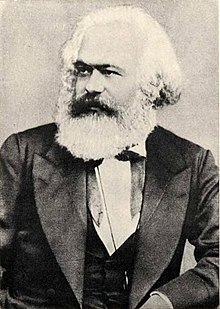Outline of Marxism

The following outline is provided as an overview of and topical guide to Marxism:
Marxism – method of socioeconomic analysis that analyzes class relations and societal conflict using a materialist interpretation of historical development and a dialectical view of social transformation. It originates from some of the work of or all of the work of the mid-to-late 19th century works of German philosophers Karl Marx and Friedrich Engels.
According to Marxist perspective, class conflicts conditions the evolution of modes of production, such as the development of slavery to feudalism to capitalism, and as such, the contradictions of capitalism demands the organization of the proletariat to establish a communist society through revolution and maintenance of the dictatorship of the proletariat. Marxism has since developed into different branches and schools of thought, and there is now no single definitive Marxist theory.[1]
History of Marxism
[edit]Marxist fields of study
[edit]Marxian critique of political economy
[edit]| Part of a series on the |
| Marxian critique of political economy |
|---|
 |
- Mode of production
- Means of production
- Relations of production
- Factors of production
- Capital
- Surplus value
- Surplus labour
- Surplus product
- Law of value
Marxist sociology
[edit]| Part of a series on |
| Marxism |
|---|
- Social class / Marxian class theory
- False consciousness
- Class consciousness
- Class struggle
- Alienation
- Base and superstructure
- Social metabolism
Marxist philosophy
[edit]Marxist schools of thought
[edit]
- Classical Marxism
- De Leonism
- Orthodox Marxism
- Luxemburgism
- Leninism
- Bordigism
- Council communism
- Eurocommunism
Persons influential in Marxism
[edit]- Marx and Engels influences
- Marxist theorists
- Other persons
Marxist bibliography
[edit]Works by Karl Marx and Friedrich Engels
[edit]- Marx and Engels
- The Holy Family (1844)
- The German Ideology (1846)
- The Communist Manifesto (1848)
- Revolution and Counter-Revolution in Germany (1851–1852)
- The Civil War in the United States (1861–1862)
- Marx
- The Eighteenth Brumaire of Louis Napoleon (1852)
- Grundrisse (1857–1858)
- A Contribution to the Critique of Political Economy (1859)
- Theses on Feuerbach (1888)
- Das Kapital
- Das Kapital, Volume I (1867)
- Das Kapital, Volume II (1885)
- Das Kapital, Volume III (1894)
- Engels
Works by Karl Kautsky
[edit]- The Class Struggle (Erfurt Program) (1892)
- Forerunners of Modern Socialism (1895)
- The Dictatorship of the Proletariat (Kautsky) (1918)
Works by Vladimir Lenin
[edit]- What Is to Be Done? (1902)
- The State and Revolution (1917)
- Imperialism, the Highest Stage of Capitalism (1917)
- The Tasks of the Proletariat in the Present Revolution (The April Theses, 1917)
- "Left-Wing" Communism: An Infantile Disorder (1929)
Works by Joseph Stalin
[edit]Works by Leon Trotsky
[edit]- The Permanent Revolution (1930)
- The Revolution Betrayed (1937)
Works by Mao Zedong
[edit]- On Guerrilla Warfare (1937)
- On Practice (1937)
- On Contradiction (1937)
- On Protracted War (1938)
Other influential works
[edit]- History and Class Consciousness (György Lukács, 1923)
- Prison Notebooks (Antonio Gramsci, 1929–1935)
- Ideology and Ideological State Apparatuses (Louis Althusser, 1970)
Marxist academic journals
[edit]Marxist organizations
[edit]Early organizations
[edit]International Marxist organizations
[edit]United States
[edit]- All-African People's Revolutionary Party
- American Labor Party
- American Workers Party
- Black Panther Party
- Communist Party (Marxist–Leninist) (United States)
- Communist Party USA
- Freedom Socialist Party
- Internationalist Workers Party (Fourth International)
- Party for Socialism and Liberation
- Red Guard Party
- Revolutionary Communist Party, USA
- Socialist Action (United States)
- Socialist Alternative (United States)
- Socialist Equality Party (United States)
- World Socialist Party of the United States
- Workers Party (United States)
- Workers Party of the United States
- Workingmen's Party of the United States
See also
[edit]References
[edit]- ^ Wolff and Resnick, Richard and Stephen (August 1987). Economics: Marxian versus Neoclassical. The Johns Hopkins University Press. p. 130. ISBN 0-8018-3480-5.
The German Marxists extended the theory to groups and issues Marx had barely touched. Marxian analyses of the legal system, of the social role of women, of foreign trade, of international rivalries among capitalist nations, and the role of parliamentary democracy in the transition to socialism drew animated debates ... Marxian theory (singular) gave way to Marxian theories (plural).
External links
[edit]- Marxists Internet Archive (MIA)
- Marxmail.org
- Marx Myths & Legends
- Marxism Page
- History of Economic Thought: Marxian School
- History of Economic Thought: Neo Marxian
- London Philosophy Study Guide on Marxism (offers many suggestions on what to read, depending on student's familiarity with the subject)
